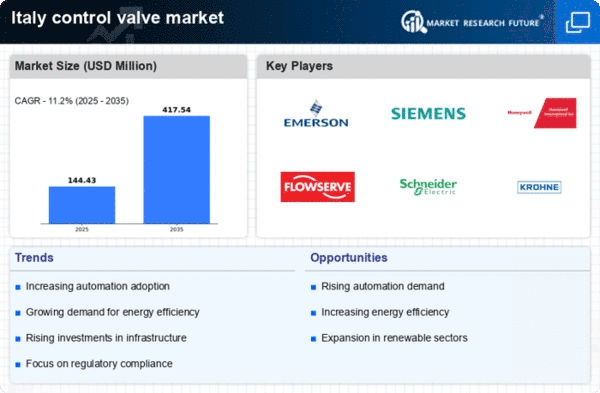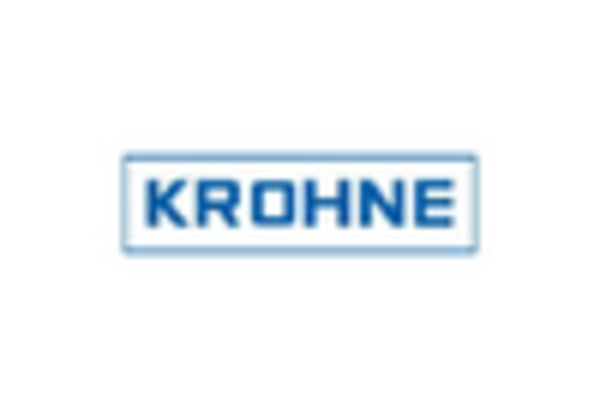Energy Sector Transformation
The transformation of the energy sector in Italy is a pivotal driver for the control valve market. With a strong emphasis on renewable energy sources, such as wind and solar, the demand for control valves is expected to rise. In 2025, renewable energy is projected to account for over 30% of Italy's energy mix, necessitating advanced control systems to manage variable energy flows. Control valves are essential for optimizing the performance of renewable energy installations, ensuring stability and efficiency. Additionally, the transition from traditional energy sources to cleaner alternatives requires the retrofitting of existing systems with modern control valves, further stimulating market growth. This shift not only supports Italy's energy independence but also aligns with broader environmental objectives, making the control valve market a critical component of this transformation.
Industrial Automation Growth
The control valve market in Italy is experiencing a notable surge due to the increasing adoption of industrial automation across various sectors. As industries strive for enhanced efficiency and productivity, the demand for automated control systems, including control valves, is on the rise. In 2025, the automation market in Italy is projected to grow by approximately 15%, which directly influences the control valve market. This growth is driven by the need for precise control in manufacturing processes, leading to a higher requirement for advanced control valves. Furthermore, industries such as oil and gas, water treatment, and chemicals are increasingly integrating automated solutions, thereby propelling the control valve market forward. The trend towards smart manufacturing and Industry 4.0 initiatives further emphasizes the importance of control valves in achieving operational excellence.
Infrastructure Development Initiatives
Italy's ongoing infrastructure development initiatives are significantly impacting the control valve market. The government has allocated substantial funds for upgrading and expanding infrastructure, particularly in water management and energy sectors. In 2025, investments in infrastructure are expected to reach €30 billion, creating a robust demand for control valves. These valves play a crucial role in regulating flow and pressure in various applications, including pipelines and treatment plants. As Italy focuses on sustainable development, the need for efficient water and energy management systems becomes paramount, further driving the control valve market. The integration of modern control valves in new infrastructure projects is likely to enhance operational efficiency and reduce environmental impact, thereby aligning with Italy's sustainability goals.
Technological Innovations in Valve Design
Technological innovations in valve design are reshaping the control valve market in Italy. The introduction of smart valves equipped with IoT capabilities is enhancing operational efficiency and reliability. These advanced control valves can provide real-time data and analytics, allowing for better decision-making and predictive maintenance. In 2025, it is anticipated that the market for smart control valves will grow by 20%, driven by the increasing demand for automation and data-driven solutions. This trend is particularly evident in sectors such as pharmaceuticals and food processing, where precision and compliance with stringent regulations are paramount. The integration of cutting-edge technologies in valve design not only improves performance but also positions the control valve market as a leader in innovation within the industrial landscape.
Environmental Regulations and Sustainability
The control valve market in Italy is significantly influenced by stringent environmental regulations and a growing emphasis on sustainability. As industries face increasing pressure to reduce emissions and improve energy efficiency, the demand for control valves that meet these regulatory standards is rising. In 2025, it is expected that compliance with environmental regulations will drive a 10% increase in the adoption of advanced control valves. These valves are essential for optimizing processes and minimizing waste in sectors such as chemical manufacturing and wastewater treatment. Furthermore, the focus on sustainable practices is prompting companies to invest in technologies that enhance resource efficiency, thereby further propelling the control valve market. The alignment of market offerings with environmental goals is likely to create new opportunities for growth and innovation.
















